-
 Bitcoin
Bitcoin $114400
0.68% -
 Ethereum
Ethereum $3550
2.48% -
 XRP
XRP $3.001
4.99% -
 Tether USDt
Tether USDt $0.9999
0.01% -
 BNB
BNB $757.6
1.46% -
 Solana
Solana $162.9
1.07% -
 USDC
USDC $0.9998
0.00% -
 TRON
TRON $0.3294
0.91% -
 Dogecoin
Dogecoin $0.2015
2.46% -
 Cardano
Cardano $0.7379
2.01% -
 Stellar
Stellar $0.4141
8.83% -
 Hyperliquid
Hyperliquid $37.83
-1.91% -
 Sui
Sui $3.454
0.76% -
 Chainlink
Chainlink $16.62
3.53% -
 Bitcoin Cash
Bitcoin Cash $554.6
2.84% -
 Hedera
Hedera $0.2486
3.91% -
 Ethena USDe
Ethena USDe $1.001
0.00% -
 Avalanche
Avalanche $21.95
3.34% -
 Toncoin
Toncoin $3.563
-2.85% -
 Litecoin
Litecoin $112.7
2.65% -
 UNUS SED LEO
UNUS SED LEO $8.977
0.13% -
 Shiba Inu
Shiba Inu $0.00001232
1.85% -
 Uniswap
Uniswap $9.319
2.93% -
 Polkadot
Polkadot $3.632
1.38% -
 Monero
Monero $307.2
2.36% -
 Dai
Dai $0.9997
-0.03% -
 Bitget Token
Bitget Token $4.340
0.91% -
 Pepe
Pepe $0.00001048
1.07% -
 Cronos
Cronos $0.1348
3.26% -
 Aave
Aave $261.5
1.93%
What taxes and fees need to be paid when investing in currency ETFs?
Navigating the tax implications of currency ETFs requires understanding income taxes (dividends, capital gains), trading fees, and currency exchange fees, with proper calculation to fulfill tax obligations.
Jan 07, 2025 at 06:44 am
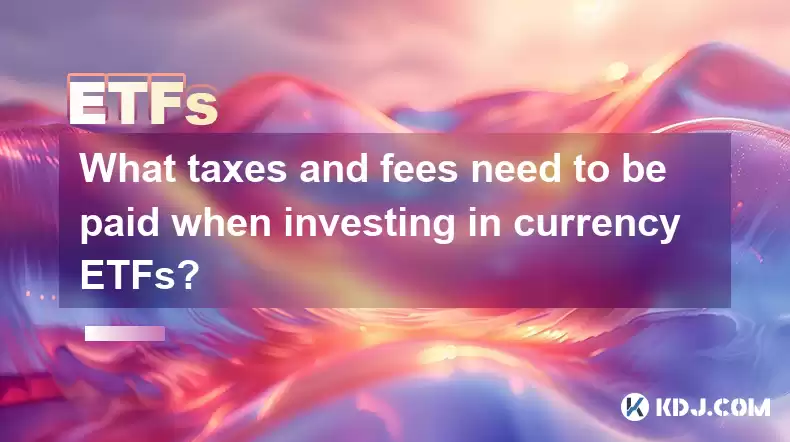
Key Points:
- Understanding the tax implications of currency ETFs
- Types of taxes and fees associated with currency ETFs
- Steps to calculate and pay applicable taxes
Taxes Associated with Currency ETFs
When investing in currency ETFs, several taxes and fees may apply, depending on factors such as the investor's tax status, the type of ETF, and the holding period.
1. Income Taxes:
- Dividend income: Currency ETFs may distribute dividends to shareholders representing the dividend income earned from the underlying currencies. These dividends are typically taxed as ordinary income at the investor's marginal tax rate.
- Capital gains taxes: When an investor sells currency ETFs at a profit, they may incur capital gains taxes. Short-term capital gains, held for less than a year, are taxed at the investor's ordinary income tax rate. Long-term capital gains, held for over a year, are typically taxed at a lower rate, depending on the investor's tax bracket.
- Foreign Currency Gain (FXG) If an investor holds a currency ETF that invests in foreign currencies, they may be subject to FXG. This is a special tax rule that applies when a foreign currency appreciates significantly against the U.S. dollar. In such cases, the investor may have to pay taxes on the unrealized gains even if they haven't sold the ETF.
2. Trading Fees:
- Brokers' fees: Most brokers charge a commission for executing ETF trades. These fees can vary depending on the broker, the size of the trade, and the type of account.
- Market Impact Fee (MIF) ETF trades may result in a MIF, which is a small fee charged by the exchange to cover the impact of the trade on the underlying market. This fee is typically a flat amount or a percentage of the trade value.
3. Currency Exchange Fees:
- Conversion Fee: If an investor purchases a currency ETF denominated in a foreign currency, they may incur a currency conversion fee. This fee is charged by the broker or custodian for converting the investor's home currency into the foreign currency used by the ETF.
- Foreign Transaction Fee (FTF) Investors may also encounter FTFs when using their credit card or debit card to purchase currency ETFs. These fees are typically a percentage of the transaction value and are charged by the card issuer.
Steps to Calculate and Pay Applicable Taxes:
- Determine taxable income: Calculate the dividend income and capital gains realized from currency ETF investments.
- Apply tax rates: Determine the applicable tax rates for income earned from dividends and capital gains.
- Deduct allowable expenses: Subtract any allowable expenses, such as broker's fees or MIF, from the taxable income.
- Report taxable income: Report the net taxable income on your tax return.
- Pay taxes: Pay the calculated taxes to the appropriate tax authority.
FAQs:
- Are currency ETFs tax-free?
No, currency ETFs are generally subject to income taxes and capital gains taxes. - How can I minimize taxes on currency ETF investments?
Consider holding currency ETFs for a long period to qualify for lower long-term capital gains tax rates. Consult a tax advisor for personalized advice on tax optimization strategies. - What is the tax treatment of currency ETFs held in retirement accounts?
Currency ETFs held in individual retirement accounts (IRAs) or employer-sponsored retirement plans (401(k)s) are typically tax-deferred. This means that income and capital gains are not taxed until the funds are withdrawn from the account.
Disclaimer:info@kdj.com
The information provided is not trading advice. kdj.com does not assume any responsibility for any investments made based on the information provided in this article. Cryptocurrencies are highly volatile and it is highly recommended that you invest with caution after thorough research!
If you believe that the content used on this website infringes your copyright, please contact us immediately (info@kdj.com) and we will delete it promptly.
- Cryptocurrency, Altcoins, and Profit Potential: Navigating the Wild West
- 2025-08-04 14:50:11
- Blue Gold & Crypto: Investing Disruption in Precious Metals
- 2025-08-04 14:30:11
- Japan, Metaplanet, and Bitcoin Acquisition: A New Era of Corporate Treasury?
- 2025-08-04 14:30:11
- Coinbase's Buy Rating & Bitcoin's Bold Future: A Canaccord Genuity Perspective
- 2025-08-04 14:50:11
- Coinbase's Buy Rating Maintained by Rosenblatt Securities: A Deep Dive
- 2025-08-04 14:55:11
- Cryptos, Strategic Choices, High Returns: Navigating the Meme Coin Mania
- 2025-08-04 14:55:11
Related knowledge

What role does SEC play in Bitcoin ETF approval?
Feb 25,2025 at 06:48am
Key Points:SEC's Role in Bitcoin ETF Approval ProcessHistorical Efforts to Establish a Bitcoin ETFSEC's Criteria for Bitcoin ETF ApprovalPotential Imp...

Who is eligible to issue Bitcoin ETFs?
Feb 25,2025 at 11:13am
Key Points:Only regulated financial institutions with the necessary expertise and infrastructure are eligible to issue Bitcoin ETFs.The Securities and...
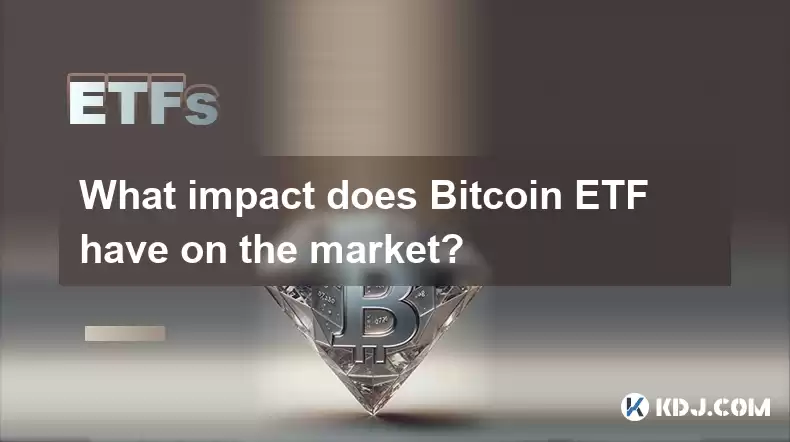
What impact does Bitcoin ETF have on the market?
Feb 25,2025 at 11:37am
Key Points:Introduction to Bitcoin ETFs and their role in the cryptocurrency marketHistorical development and performance of Bitcoin ETFsPotential ben...
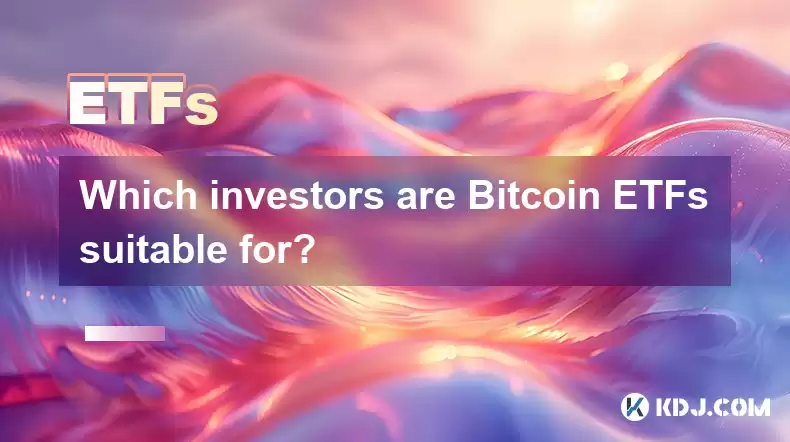
Which investors are Bitcoin ETFs suitable for?
Feb 27,2025 at 04:01pm
Key Points:Understanding Bitcoin ETFsBenefits of Bitcoin ETFsSuitability of Bitcoin ETFs for Different InvestorsAssessing Risk Tolerance and Investmen...
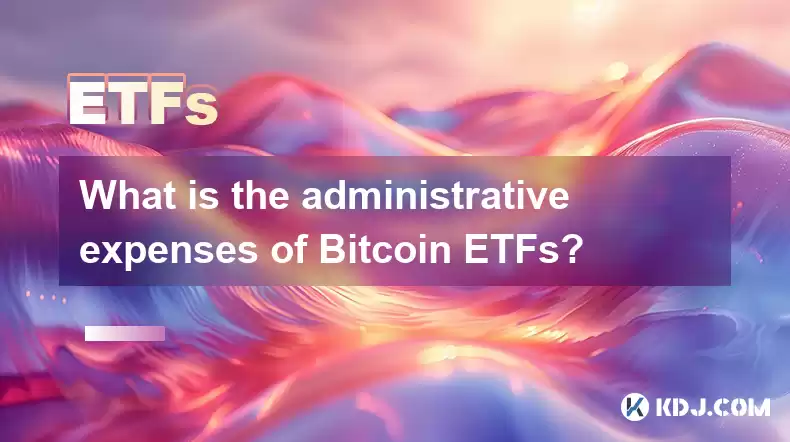
What is the administrative expenses of Bitcoin ETFs?
Feb 26,2025 at 12:24am
Key Points:Administrative expenses are a crucial factor to consider when evaluating Bitcoin ETFs.These expenses can significantly impact the performan...
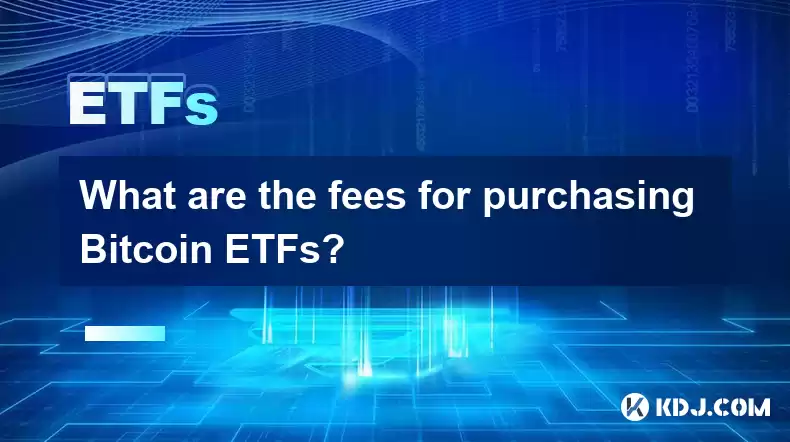
What are the fees for purchasing Bitcoin ETFs?
Feb 27,2025 at 07:13pm
Key Points:Bitcoin exchange-traded funds (ETFs) are a cost-effective and regulated way to gain exposure to Bitcoin.Fees associated with Bitcoin ETF pu...

What role does SEC play in Bitcoin ETF approval?
Feb 25,2025 at 06:48am
Key Points:SEC's Role in Bitcoin ETF Approval ProcessHistorical Efforts to Establish a Bitcoin ETFSEC's Criteria for Bitcoin ETF ApprovalPotential Imp...

Who is eligible to issue Bitcoin ETFs?
Feb 25,2025 at 11:13am
Key Points:Only regulated financial institutions with the necessary expertise and infrastructure are eligible to issue Bitcoin ETFs.The Securities and...

What impact does Bitcoin ETF have on the market?
Feb 25,2025 at 11:37am
Key Points:Introduction to Bitcoin ETFs and their role in the cryptocurrency marketHistorical development and performance of Bitcoin ETFsPotential ben...

Which investors are Bitcoin ETFs suitable for?
Feb 27,2025 at 04:01pm
Key Points:Understanding Bitcoin ETFsBenefits of Bitcoin ETFsSuitability of Bitcoin ETFs for Different InvestorsAssessing Risk Tolerance and Investmen...

What is the administrative expenses of Bitcoin ETFs?
Feb 26,2025 at 12:24am
Key Points:Administrative expenses are a crucial factor to consider when evaluating Bitcoin ETFs.These expenses can significantly impact the performan...

What are the fees for purchasing Bitcoin ETFs?
Feb 27,2025 at 07:13pm
Key Points:Bitcoin exchange-traded funds (ETFs) are a cost-effective and regulated way to gain exposure to Bitcoin.Fees associated with Bitcoin ETF pu...
See all articles

























































































